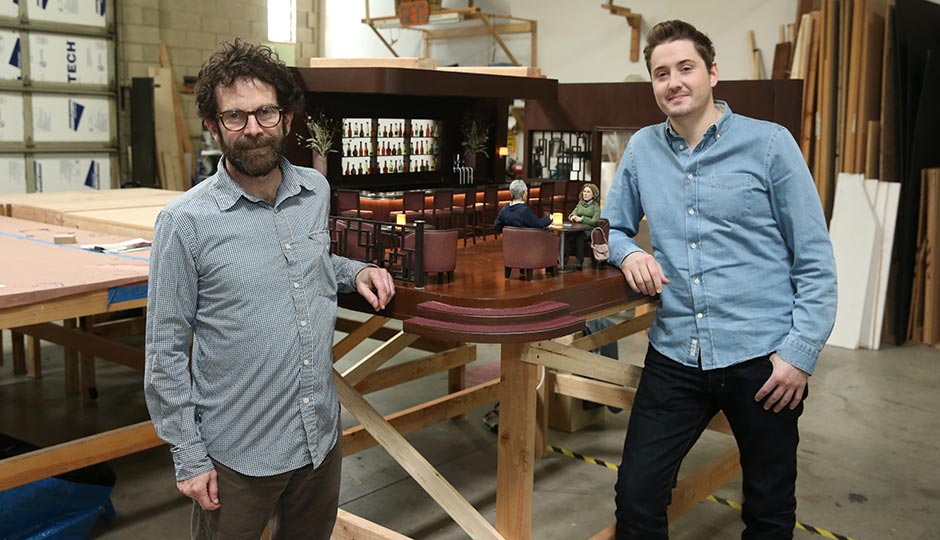5 Questions: Charlie Kaufman and Duke Johnson on Anomalisa

Charlie Kaufman, left, and Duke Johnson. Photo courtesy of Viacom
Writer/director Charlie Kaufman has long been known for his quietly gonzo sensibility. His career highlights include grappling with both the comically metaphysical (Being John Malkovich) and the emotionally metaphoric (Eternal Sunshine of the Spotless Mind), as well as a predilection for questions of the self and the reality we choose to inhabit (Synecdoche). But even Kaufman’s most ardent fans – and they are quite legion – weren’t quite ready for his latest project: Anomalisa, a stunningly beautiful stop-motion elegiac about a miserably lonely corporate speaker (voice of David Thewlis) finding a potential life-partner (Jennifer Jason Leigh) on a weekend work trip to Cincinnati. Working with co-director Duke Johnson (Community), a young veteran of the medium, Kaufman creates another one of his indelible portraits of the fragility of the human soul, only this time with small, remarkably articulate dolls. The two men, in town for a sold-out screening of the film during the Philadelphia Film Festival, spoke with Ticket about making puppets emotionally gripping, their choice of cityscapes, and the intricacies of stop-motion sex.
What we really want in a drama are moments of authenticity, when we recognize something we might not have otherwise seen in ourselves, which you guys somehow do with puppets. How did you decide what level of realism you wanted for them?
Duke Johnson: We did the voices first, we brought the same three actors from the play, and now they’re in a studio setting and it was very intimate, and they were sitting together and reading it as if it were a play, which is different from the typical way they do animated films – they do them individually, you know, in a box – and the way they created the performance and reacted off of each other creating these nuanced emotional moments really influenced us with regards to our aesthetic approach to the movie. We started talking about what we wanted it to look like, and right off the bat, we realized we wanted it to have the same sort of realism, authenticity, and truth that the voice performances had.
The effect is this kind of irony where we see this level of verisimilitude but in something that is inherently not-real. Is that what makes it so effective emotionally?
Charlie Kaufman: There’s something about it that I think gives it a special focus as an audience member that you wouldn’t have otherwise, because you know on some level that this is artificially created, and so things that are very small, and gestures that are small, and movements which are small, which is mostly what this movie is mostly made up of, are fascinating to watch in a way that if an actor were doing it, it would just be ignored: He just scratched himself there, but if a puppet does it, it’s “He scratched himself! Just like a person!” I think that really served this movie because it is really small in terms of what happens and the interactions between the people.
Which brings us to the sex scene. What I found interesting about it is the way it was going for realism, I mean, it’s animated, you could have done anything — you could have made them turn into unicorns —
CK: We did that in an earlier cut, but it didn’t test well. [laughs] But that’s the thing about it: It’s intentionally nuanced and subtle and small, in a form that usually isn’t that. So for that reason it becomes fascinating to watch. We didn’t want them to turn into unicorns because we wanted that scene to be an extension of our exploring this emotional connection between these two people, and what it would it would be like for these two people, whom we’re taking very seriously to engage in this way.
Can you speak about the vocal conceit – one which I won’t directly describe?
CK: It came about because we did this radio play, and we were casting three actors and I was trying to figure out a way to creatively use one actor to play a lot of different characters. I’d read about something called the Fregoli Delusion, which is a psychiatric condition in which you think everyone else in the world is the same person. So I was thinking that was kind of a good metaphor for somebody who had certain emotional issues in connecting with people and being able to see other people fully.
I’m always fascinated by the idea of specific place in films. Out of curiosity, was there a definite reason why you chose Cincinnati? Did that help you better articulate your vision?
CK: I was looking for a city in the Midwest when I wrote it. I don’t remember why I chose Cincinnati. I have no idea. As to the second part of the question, I think we weren’t really hung up on making it look like what the city really looks like. I think the place we were trying to create is the place that is no place. That is every place. We wanted that hotel room, when the door opens and you see it for the first time, for everyone to go “I’ve stayed at that hotel, I know that hotel.” That was the creepiness of modern American culture we were looking to explore.
Anomalisa opens on two screens at the Ritz East on Friday, January 8th.
Piers Marchant is a film critic and writer based in Philly. Find more confounding amusements and diversions at his blog, Sweet Smell of Success, or read his further 142-character rants and ravings at @kafkaesque83.


